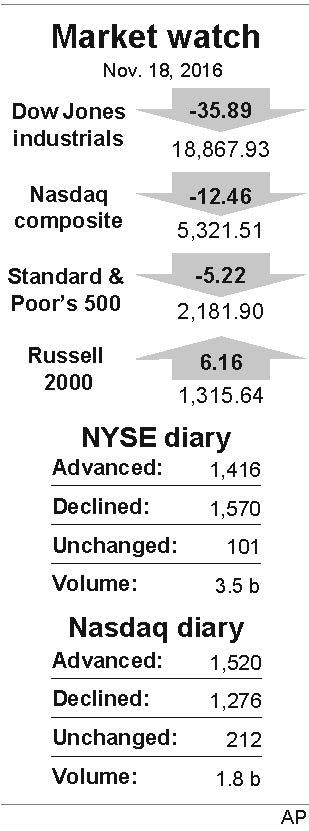Drugmaker Losses Pull Stocks Lower; Small-Cap Surge Goes On

Major U.S. stock indexes slipped Friday as drug companies dragged the market lower. Small-company stocks bucked the downward trend and continued to climb, and bond yields rose to their highest level in a year.
Drugmakers like Merck and biotech company Amgen took some of the biggest losses Friday. Weak results from Gap and Abercrombie & Fitch hurt retailers as investors kept a close eye on the upcoming shopping season.
Small companies including regional banks continued to make large gains. Those stocks have risen sharply since the presidential election last week and are now at record highs.
The Dow Jones industrial average slid 35.89 points, or 0.2 percent, to 18,867.93. The Standard & Poor’s 500 index lost 5.22 points, or 0.2 percent, to 2,181.90. The Nasdaq composite touched a record high early on, but turned lower and gave up 12.46 points, or 0.2 percent, to 5,321.51.
That’s not a big loss, but the major indexes hadn’t fallen that much since before the presidential election. Still, the S&P 500 and Nasdaq finished substantially higher this week after their big gains the week before. But indexes of smaller companies, like the Russell 2000 and the S&P 600, did better. They are on 11-day winning streaks and have hit all-time highs.
Drug company stocks are coming off their biggest weekly gain in two years. The stocks had been falling in the months leading up to the election because investors worried that under a Hillary Clinton presidency, the federal government would take steps to rein in drug prices. Those kinds of steps are less likely under a Trump presidency and a Republican-controlled Congress.
The dollar continued to climb. It’s near one-year highs against the euro and six-month highs against the yen. The dollar rose to 110.63 yen from 109.89 yen. The euro fell to $1.0599 from $1.0626.
The dollar hasn’t been this strong since early 2003. Katie Nixon, Executive Vice President and CIO of the Wealth Management business at Northern Trust, said that’s affecting big multinational companies because it can hurt their sales outside the U.S., but it’s less of a problem for smaller, domestically-oriented companies.
Investors continued to sell U.S. government bonds at a rapid clip, and bond prices wobbled and turned lower. The yield on the 10-year Treasury note rose to 2.34 percent from 2.30 percent. Bond prices have fallen hard since the election and yields are now at their highest in a year.
Benchmark U.S. crude rose 27 cents to close at $45.69 a barrel in New York, while Brent crude, which is used to price international oils, added 37 cents to $46.86 a barrel in London. Energy companies traded higher. Chevron rose $1.08, or 1 percent, to $109.20 and ConocoPhillips jumped $1.15, or 2.6 percent, to $44.76.
Gold fell $8.20 to $1,208.70 an ounce. Silver lost 15 cents to $16.62 an ounce. Copper dipped 2 cents to $2.47 a pound.
In other energy trading, wholesale gasoline stayed at $1.34 a gallon. Heating oil picked up 1 cent to $1.46 a gallon. Natural gas climbed 14 cents, or 5.2 percent, to $2.84 per 1,000 cubic feet.
France’s CAC 40 fell 0.5 percent and the FTSE 100 in Britain dipped 0.3 percent. The German DAX lost 0.2 percent. Japan’s benchmark Nikkei 225 index added 0.6 percent as the yen hit a six-month low, helping shares of the country’s big exporters. South Korea’s Kospi shed 0.3 percent and Hong Kong’s Hang Seng rose 0.4 percent.
&
To Read The Full Story
Are you already a subscriber?
Click "Sign In" to log in!

Become a Web Subscriber
Click “Subscribe” below to begin the process of becoming a new subscriber.

Become a Print + Web Subscriber
Click “Subscribe” below to begin the process of becoming a new subscriber.

Renew Print + Web Subscription
Click “Renew Subscription” below to begin the process of renewing your subscription.



